Student Blog
Fieldwork
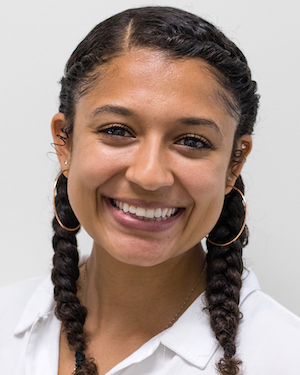
Fight on in Fieldwork ✌ ⟩
November 4, 2019, by Kat
Fieldwork What are OS/OT?
October 21st–25th . . . my full week of fieldwork . . .
This semester, for my adult rehab level I fieldwork, I was placed at Providence Saint John’s Health Center in Santa Monica. A moment of honesty . . . prior to this placement I had little knowledge about what OTs did in the hospital setting. I remember walking in on my first day in scrubs and not knowing what to expect. On my first day I got put to the test though! My CI (clinical instructor) had a patient that was in the ICU (intensive care unit) who she was going to co-treat with a PT. The patient’s case was quite complicated and they needed help. I helped manage the patient’s lines (meaning I helped with all of the IV’s and tubes) as the OT and PT helped the patient sit on the edge of his bed. This small task of managing a patient’s lines gave me great insight into the impact that an acute inpatient OT can have on a person. Throughout my time at St. John’s I have learned that OTs in the hospital setting are essential to the safety and quality of life of patients. Not only do they ensure that a patient can be safe with their self-care routine, but they also help develop or fine tune the skills necessary for patients to be able to continue participating in the activities that are important to them — their meaningful occupations!
During my full week, I was able to see so many things. I was in the inpatient wings, the NICU (with the wittle babies!), and also had a trip down to the ER to see what a respiratory therapist does and how their work can influence the work an OT does. I was busssyyy! But I had so much fun. Also, how cool is it that my CI is an alumni from USC?! I can honestly say that I am blessed to be shadowing and working with the AMAZING Ally Buescher. I have learned so much from her. She has high expectations for me as a level I student which is pushing me to develop my clinical reasoning skills. She also has so much knowledge about the field and about the program at USC, which is helpful when I have a million questions.
USC has a deep line-up when it comes to networking. USC releases talented OTs into the world and many of them host students for their fieldwork. We literally have people everywhere! National and international possibilities are available. It is nice to know that as a student, I am well taken care of by the fieldwork coordinators here in the Chan Division. The fieldwork opportunities I have been able to experience so far have been one of a kind. My first ever level I fieldwork experience was a competitive Skid Row Housing Trust position where I was mentored by the renowned Dr. Deborah Pitts! This specific mentorship was made possible because of a city grant that was established for the Fall of 2018. Here’s a little more info about Level I fieldwork.
Long story short, my full week of fieldwork was a blast and USC offers remarkable fieldwork experiences!
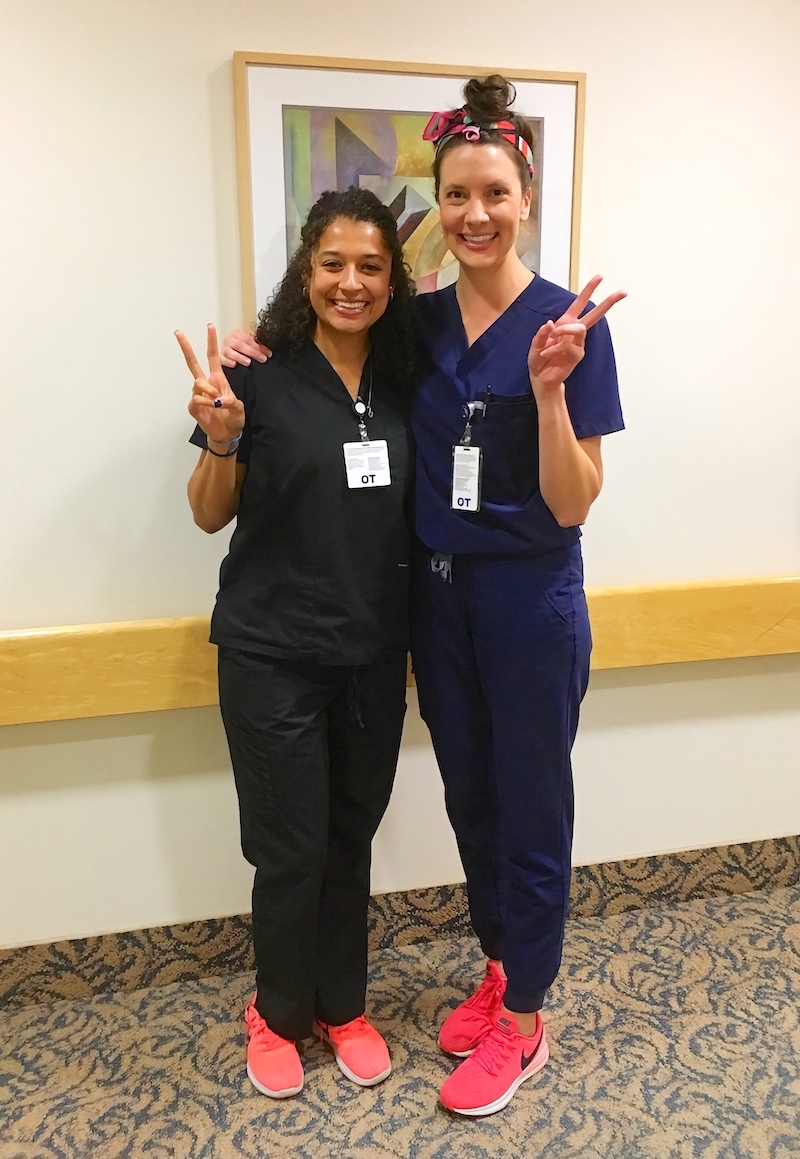
Ally and I reppin that Trojan life! Fight on! ✌ PS, we coordinate our shoe game
⋯
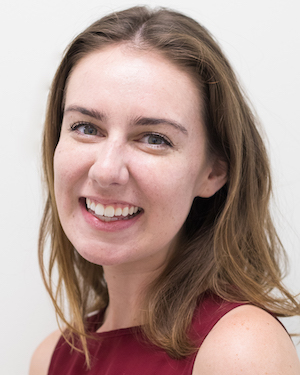
Fieldwork Makes the Dream Work ⟩
September 23, 2019, by Noelle
Fieldwork Life Hacks
Last Wednesday marked my last first day of Level I Fieldwork ever! Now, the words “fieldwork placement” tend to elicit different emotions from different students. I know I for one get a weird mix of excitement and anxiety that results in an expression resembling the nervous smile emoji — what if I hate where I’m placed? What if it’s my new dream job? What if I don’t get along with the Clinical Instructor? Oh god what’s the commute going to look like? I just hope there’s parking . . . 😬
I’m not going to lie, those thoughts raced through my mind at the start of every semester including this one. But I’ve made it to this point and can confidently say that my fieldwork experience has been one of the highlights of this program for me. And it’s not because I was placed at any particular site or found my absolute dream position. I made a commitment to myself last fall that I was going to trust the process. HA! Trust the process?! Yeah it wasn’t easy. I forced myself to let go of the expectations that where I was placed was going to determine my future job, OTD, etc (it sounds ridiculous to me now but I felt that back then). Luckily for me though, I have always been a “it is what you make it” kind of girl, and I believe that attitude served me very well when it came to fieldwork. At each placement, I found aspects I loved and will now seek out as well as things I really didn’t like and will avoid when I’m looking for positions in the future. I discovered new things about OT, about myself, that I may not have had I chosen my placements. By trusting the process and seeing level I fieldwork for what it is — an opportunity to get exposed to a population and a setting — I can move forward with no regrets and lots of lessons learned for wherever the process takes me next!
After all this “trust the process” talk, how could I not recommend Etta James’s “Trust in Me”?
⋯
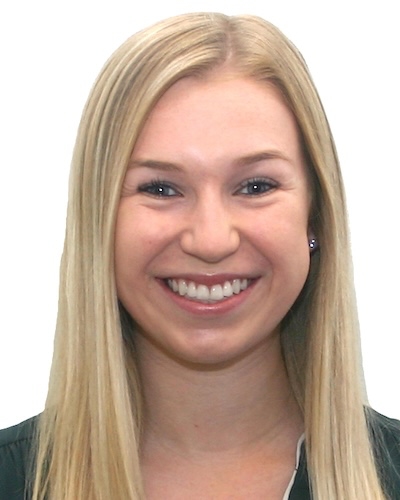
My SChedule ⟩
November 17, 2018, by Jessica P.
Classes Fieldwork School/Life Balance
As an ambassador, one of the most common questions I get from prospective students is “what does your typical schedule look like?” Along with this, people ask if there’s time to work, time for self-care, and balance in your weekly schedule. My fellow ambassadors, Joyce and Evan, recently discussed working and having a baby in grad school. From my personal experience, I think it all has to do with balance.
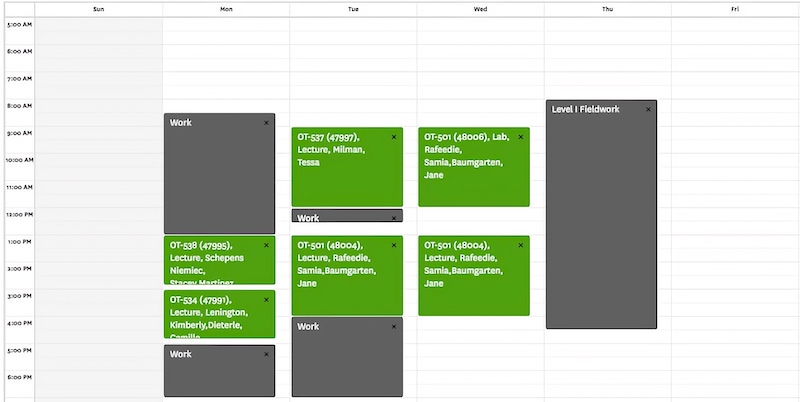
My Fall 2018 schedule
Throughout the program, it is typical to be in the classroom 3 days a week, 1 day in fieldwork, and 1 day off. For the days that we’re in the classroom, it is normal to have class 9am-12pm, a lunch break 12pm-1pm, and then class again from 1pm-4pm. For many people, like myself, a three-hour class may sound daunting, but it’s not. Luckily, all of our professors give us breaks with plenty of time to grab coffee, snacks, or simply take a quick walk outside to get some fresh air. Most of our classes utilize team-based learning, meaning that we usually are not getting a lecture for the entire class time. For example, in my Adult Physical Rehabilitation course we spend class time doing hands-on case applications where we apply what we have already studied on our own.
Everyone’s fieldwork hours will be slightly different, as you will follow whatever hours your clinical instructor works. The hours occupational therapists work may look different in the various settings. For example, my pediatrics level I fieldwork was 10am-6pm as many of our pediatric clients were coming after school. This semester, I just finished my last level I fieldwork at an outpatient lymphedema clinic where my hours were 8am-4:30pm.
As a student ambassador, I have the privilege to work 10 hours a week for the division doing various tasks and events. I have found working 10 hours per week is manageable, but it is something I have to plan for. I know that I have weekly quizzes on Tuesday, so on Sunday’s I study for my quizzes instead of cramming late on Monday night. Many of my classmates also work around 10 hours, doing other student worker positions at USC, such as being classroom assistants or research assistants. We probably would all agree that working that amount is doable, but anything more than that could be stressful on top of your coursework.
One of my favorite days though is my day off. While I love being in the classroom and at fieldwork, I depend on my day off to recharge and prepare for the upcoming week ahead. By having a day off, I think it really allows us to have a balanced schedule with time to have doctor’s appointments, work, catch up readings, etc.
Throughout grad school, there will definitely be weeks where it can feel overwhelming. My best advice is to listen to your own body and what balance looks like for you. You may need a full 8 hours of sleep while some of your classmates seem to fully function off of only 5 hours, but always listen to what is best for you. Transitioning to grad school is definitely a transition into a new role in life, but once you get a hang of the schedule and what works for you — you will own it!
⋯
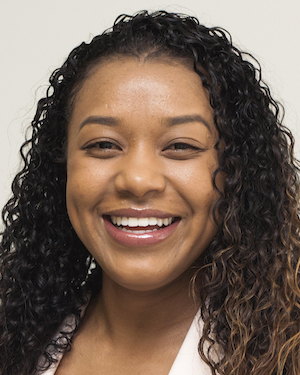
Infusing Yoga into Fieldwork ⟩
November 12, 2018, by Serena
Fieldwork
I am completing my Level I Fieldwork and Jennifer is completing her Level II Fieldwork at the USC Kortschak Center for Learning and Creativity (KCLC) under the mentorship of a previous student ambassador, Dr. Rashelle Nagata. As mentioned in my previous post, the USC KCLC is an academic support center that addresses challenges related to academic performance such as time management techniques, procrastination, self-care strategies, and stress management skills.
Dr. Nagata is our wonderful Fieldwork Educator (FE). A FE, formerly known as a Clinical Instructor (CI), is typically an occupational therapist who mentors and supervises you during your FW experience. In the beginning of our FW, Jennifer and I worked together to build an occupational therapy informed yoga class that incorporated meditation, mindfulness, and gentle yoga stretches to provide a greater awareness of useful calming and alerting strategies that can be easily incorporated throughout the day.
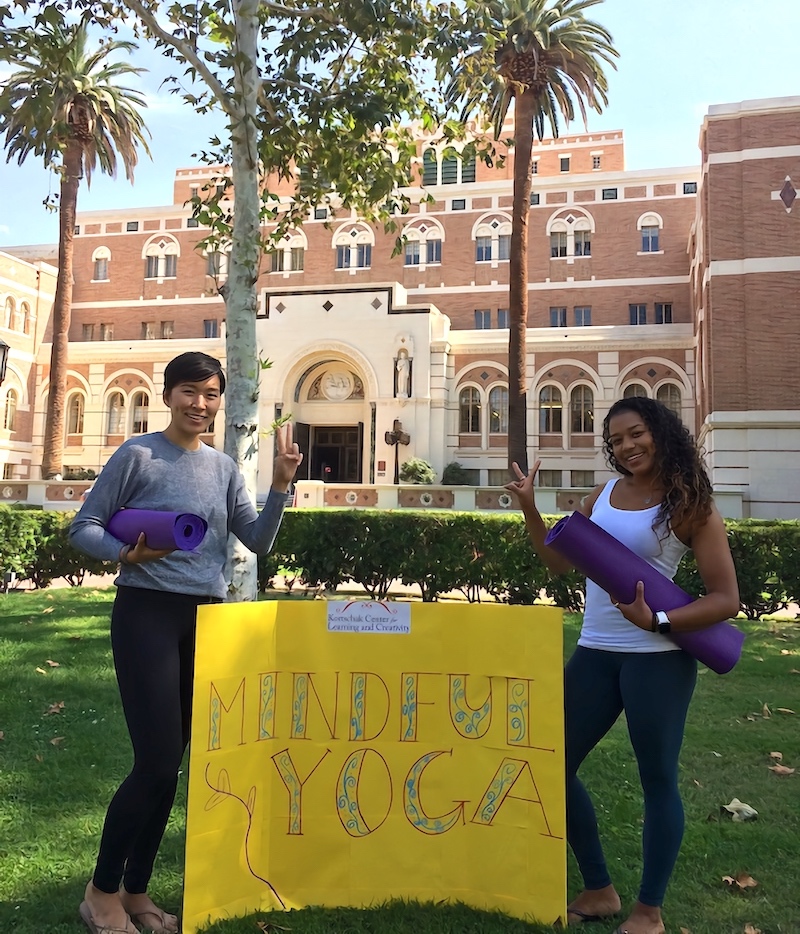
The yoga sessions, which are trauma informed, first begin with a mindful breathing activity, then leads into a guided meditation, and ends with gentle yoga stretches and poses. Throughout the session, aromatherapy and bells or Tibetan sound bowls are incorporated during session to bring greater awareness to the power of senses impacting a calm and alerting state. For example, we pass around lavender in the beginning to elicit a more serene vibe. Towards the end of the session, peppermint oil is offered to those wishing to return to an environment that requires a more alert state of being. We end with the sound of bells or Tibetan bowls, which have healing benefits such as decreasing stress and anxiety.
Namaste.
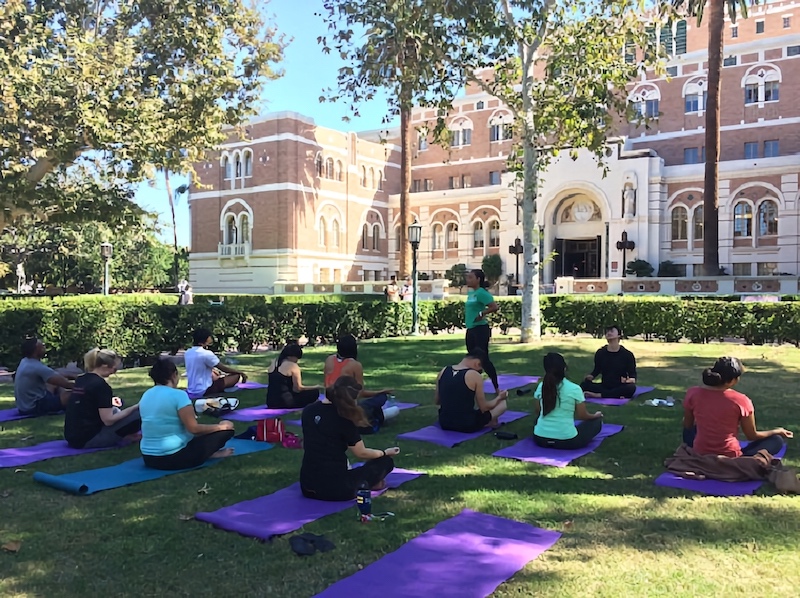
The yoga group comprised of undergraduate, graduate, staff, and faculty members performing gentle yoga stretches in front of Doheny Library on a beautiful sunny Southern California day!
⋯
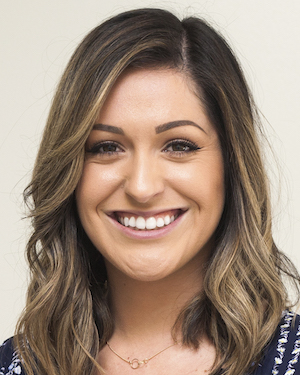
Fieldwork in Pediatric Mental Health ⟩
October 23, 2018, by Melissa
Fieldwork
Hey everyone! I wanted to talk to you guys about my experience working in pediatric mental health, as I recently completed my full week for my level I fieldwork. For those of you that don’t know a lot about what fieldwork means and what that looks like in our program, Joyce does a great job of explaining it in her blog and you can also find additional information here.
I’m not sure how much you guys already know about OT’s role in pediatric mental health, but I knew very little before taking part in this internship. This is not your typical pediatric placement, as I don’t have an occupational therapist onsite, nor am I seeing children with specific developmental or intellectual disabilities. Instead, I work with children in the early intervention program that are between the ages of 3 and 5 who have been exposed to some sort of trauma. The trauma includes, but is not limited to, domestic violence, physical abuse, sexual abuse, psychological abuse, and being removed from the home. Because of this trauma, children exhibit behaviors that prevent them from being able to participate in a typical classroom setting. Thus, they are sent to the Los Angeles Child Guidance Clinic — where I am placed this semester — in hopes that receiving mental health services can help them get back to their previous school settings.
Young children exposed to trauma often do not have the ability to understand what they have gone through. Some may be removed from their homes for an extended period of time, and others may be adopted by someone in their extended family. This is all happening while they are trying to build healthy attachments with their caregivers, which is crucial to their psychosocial development. As a result, these children may present with aggressive behaviors or tantrums that stem from an inability to regulate how their body is feeling, and that is where OTs come in! Due to our expertise in sensory strategies and techniques, we are able to give children that are presenting with dysregulation the tools they need to successfully regulate their bodies and emotions.
My favorite part about our level I fieldwork experience is the full week, as I feel that that is when I get a true feel for what my role as an OT looks like at my placement. This semester has not been different, and I feel like I have a much better understanding of what OTs role in pediatric mental health looks like. Although I do not have an OT onsite to shadow, I feel confident in my understanding of OTs role. If you ever find yourself in a similar situation, don’t be scared! You have an excellent team behind you at USC, and you should use them whenever you can. My experience has been that sites truly value occupational therapy, and are always grateful to host students. If you ever have any questions about fieldwork, pediatric mental health, or being placed at a site without an OT, don’t hesitate to reach out!
⋯





